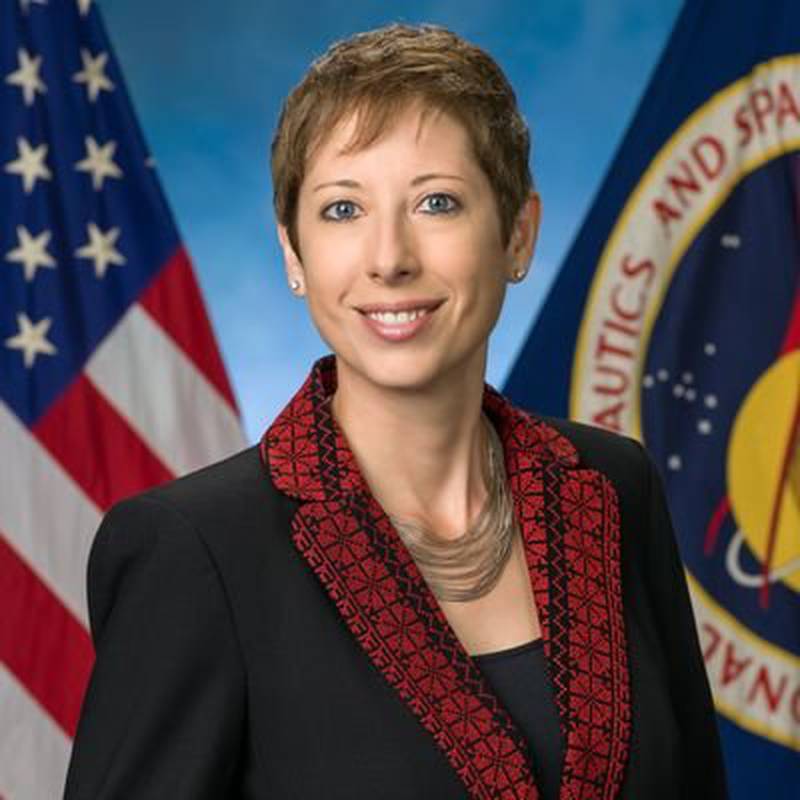Nujoud Fahoum Merancy started the Twitter hashtag ‘YallaToTheMoon’ to support latest mission.
A Palestinian-American woman is one of the leaders of the Artemis missions, a programme by Nasa that aims to fly astronauts to the Moon.
Nujoud Fahoum Merancy, 43, is the chief of exploration mission planning at the US space agency and has been working in the space sector for more than two decades.
She started the Twitter hashtag ‘YallaToTheMoon’ to support the Artemis 1 mission, which is scheduled for another launch attempt on Saturday, from Florida’s Kennedy Space Centre. ‘Yalla’ is an Arabic word that translates to ‘let’s go’ or ‘come on’.
Before the historic event, Ms Merancy spoke to The National about her Palestinian roots and her involvement in the Artemis programme.
A stellar career
The Artemis 1 mission is an unmanned flight around the Moon that will test the performance of the Space Launch System rocket and Orion spacecraft.
If successful, it would pave the way for Nasa to launch Artemis 2 and 3, crewed flights around the Moon and the first human lunar landing mission under the programme.
“As a Palestinian-American, I’m very excited to be a part of this programme,” she said.
“And, really, Nasa and Artemis, it is a much more diverse workforce than it was during the Apollo era.
“It’s important to me and to a lot of us that it represents all of humanity and Artemis itself is international because we have international partners.”
Ms Merancy, a mother-of-two, earned her bachelor’s degree in aerospace engineering from the University of Washington in Seattle.
From there, she joined the aerospace company Boeing to work on the International Space Station.
She then started working on the development of Orion, the spacecraft launching on top of Nasa’s mega Moon rocket on Saturday that will fly around the Moon — and one day carry astronauts.
“From that, I’ve transitioned into the mission planning for Artemis, which is designing and integrating the missions across all the programmes for Artemis, and that’s my current role,” she said.
Connecting with her Palestinian roots
Ms Merancy went viral on the internet in 2019 when she posted her official Nasa photo, in which she wore a blazer embroidered with Palestinian tatreez, a traditional cross-stitch, that she bought during a visit to her father’s home town of Nazareth.
Her father moved to the US more than 40 years ago to go to college.
Although she was born in the US and does not speak fluent Arabic, she said her Palestinian roots were important to her.
“I don’t speak Arabic, unfortunately, it’s one of those regrets that I’ll always have,” she said.
“I know the basics, a few words here and there, and the polite greetings.
“But I do enjoy the food and that is something I grew up on. And then as an adult, I started cooking.
“So, I have a whole bunch of Palestinian cookbooks just to learn other recipes that my family didn’t teach me.
“I do like to cook Palestinian food and that’s probably the biggest connection to the culture that I have.”
Palestinian presence in the space sector
Other Palestinians are involved in the Artemis programme or are making a name for themselves in the US space sector through other projects.
Soha Alqeshawi, born and raised in Gaza city with her seven siblings, currently works for Lockheed Martin as a software engineering associate manager and looks after Orion’s back up-flight software.
And Loay Elbasyouni is a Palestinian-American electrical engineer who helped design Nasa’s Mars rover, Perseverance.
“My parents did their best to provide me and my siblings with a good education and shield us from the effects of the continuous horrific conflict that Gaza has been living under,” Ms Alqeshawi told Portuguese journalist Margarida Santos Lopes in 2015.
“Living under constant fear and despair where everything is uncertain and basic life necessities such as electricity and sometimes water are unavailable for most of the day.
“Although I was the only one in my family who had the opportunity to leave Gaza for the US to study and work, all of my brothers and sisters are college-educated with degrees in science, engineering and business.”
“Going to school was sometimes a dangerous journey that could have death waiting at any step of the way.
“However, that made us more determined to achieve our dreams in receiving an education.’
source/content: thenationalnews.com (headline edited)
____________

_____________________________
AMERICAN / PALESTINIAN